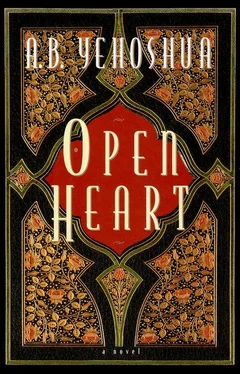A. Yehoshua - Open Heart
Здесь есть возможность читать онлайн «A. Yehoshua - Open Heart» весь текст электронной книги совершенно бесплатно (целиком полную версию без сокращений). В некоторых случаях можно слушать аудио, скачать через торрент в формате fb2 и присутствует краткое содержание. Год выпуска: 2014, Издательство: Peter Halban, Жанр: Современная проза, на английском языке. Описание произведения, (предисловие) а так же отзывы посетителей доступны на портале библиотеки ЛибКат.
- Название:Open Heart
- Автор:
- Издательство:Peter Halban
- Жанр:
- Год:2014
- ISBN:нет данных
- Рейтинг книги:3 / 5. Голосов: 1
-
Избранное:Добавить в избранное
- Отзывы:
-
Ваша оценка:
- 60
- 1
- 2
- 3
- 4
- 5
Open Heart: краткое содержание, описание и аннотация
Предлагаем к чтению аннотацию, описание, краткое содержание или предисловие (зависит от того, что написал сам автор книги «Open Heart»). Если вы не нашли необходимую информацию о книге — напишите в комментариях, мы постараемся отыскать её.
Open Heart — читать онлайн бесплатно полную книгу (весь текст) целиком
Ниже представлен текст книги, разбитый по страницам. Система сохранения места последней прочитанной страницы, позволяет с удобством читать онлайн бесплатно книгу «Open Heart», без необходимости каждый раз заново искать на чём Вы остановились. Поставьте закладку, и сможете в любой момент перейти на страницу, на которой закончили чтение.
Интервал:
Закладка:
But Sir Geoffrey was not happy to hear that his hospital’s old EKG machine had been right. He would have preferred it to be wrong. He told me about Lazar’s impending catheterization with a grave face, which immediately caused me new anxiety. Even though catheterizations and coronary bypass surgery had by now become such daily occurrences that Hishin, who was not a cardiac surgeon, dismissed them with contempt, the fact that coronary heart disease was apparently associated with arrhythmias in London made the whole case more complicated. I tried to remember if Dr. Arnold had mentioned whether Lazar’s was a ventricular or supraventricular arrhythmia, the ventricular being the more dangerous. Who did I think I was, I rebuked myself, trying to diagnose the heart disease of a person thousands of miles away, the director of a hospital who was surrounded by experts in their field and who certainly didn’t need the help of a young resident like me with practically no experience in cardiology? But perhaps it was the thought that the incriminating EKG had taken place exactly at the time when one or two miles away I had been committing adultery with his wife that which gave rise to my anxiety and guilt, as if in some mysterious way my actions had caused his heart to fibrillate while at the same time he had made me fail. All these thoughts may have been legitimate in a young man embarking on the kind of adventures you read about in novels, but in my case they prompted me to take action. I went to a pay phone and put through a call to Lazar’s office to ask how he was feeling and how the catheterization had gone. Lazar’s loyal and devoted secretary was very moved by my interest, and she tried to answer as briefly and economically as possible in order to save me money. It appeared that the doctors thought that it was not a case of simple coronary disease, although they could not be sure until they had the results of the catheterization. The trouble was, complained the secretary, that too many doctors, friends and acquaintances, were interfering and giving advice, so it was a good thing that Professor Hishin was going to take charge. “But how come?” I cried in protest. “He’s not a cardiac surgeon!”
“So what?” she answered. “He won’t do the operation, but he’ll decide on the surgeon, and naturally he’ll supervise him during the surgery.”
This report from Tel Aviv, instead of reassuring me, only increased my agitation. I say agitation and not anxiety because what was there to be anxious about? If they decided on bypass surgery — with one, two, or even three or more bypasses — this was a routine operation in good hands, with a mortality rate of less than one percent in healthy men who had never suffered a myocardial infarction. My inner agitation therefore stemmed from moral rather than medical concerns. Since we now had only one month left before our return, and Sir Geoffrey insisted that I take the last two weeks as vacation due to me, I decided to ask Michaela, as tactfully as I could, if we could go home two weeks earlier than planned so that I could be present at Lazar’s surgery. At first she couldn’t believe her ears, and demanded that I explain my reasons again and again. After she had begged me to extend our stay, if only by a month, I was now asking her to move the date up by two weeks. She was stunned. For the first time since our wedding one year before, we began a confrontation that almost turned into a real crisis. Although the argument was conducted in cold and ironic tones, it was fierce and even cruel. Because of the cooling off in our sexual relations, we did not try, as a more passionate pair might have, to take our revenge on each other in bed. Free of any overtones of sexual aggression or calculation, our argument might have seemed to an outside observer calm and civilized, if sharp and penetrating. I did not try to lie to Michaela and invent excuses for my wish to return, but spoke frankly about my concern for Lazar and my need to be there to support him and his wife during the surgery. Since I could not yet admit, even to myself, the true, deep source of my anxiety and agitation, in order to persuade Michaela I had to transfer part of my impossible love for Dori to Lazar himself, as if he had become a beloved friend during the trip to India, even a kind of father figure, to whom I owed my support. “You really think he’ll be short of people to support him there? To the extent that you have to go running from England wagging your tail like a puppy?” said Michaela bitterly, narrowing her big eyes as if she could already see in the distance a miserable little dog slinking into the hospital gates and wagging his tail ingratiatingly. “You’re right,” I admitted frankly, “he won’t be short of people there. But how can I explain it to you? I’m not going for his sake but for my own.” In the end she grew tired of struggling against my obscure desires and vague arguments and cut short the argument with a surprising suggestion. If I was so desperate to attend Lazar’s operation, I could go alone, and she would come later, on the date we had previously agreed on, or even, why not? — a sly, unfamiliar smile suddenly dawned on her face, while her eyes widened again in enjoyment — perhaps she would come later, for if I allowed myself to go home two weeks early, by the same logic, and according to the principles of justice and equality, she could allow herself to come two weeks late. “And the baby?” I asked immediately. “What about Shivi?”
“The baby?” she repeated thoughtfully, with the cunning smile still on her face. “Maybe she’ll be the only one to go back on the original date. We’ll divide Shivi between us. Fair’s fair. I’ll find someone here to take her back to Israel, and you’ll have plenty of time to organize things for her there, or maybe you can give her to your mother for a while, to give me the pleasure of remaining completely on my own.”
And so it was. But after I had advanced the date of my flight by two weeks and the travel agent had warned me that I wouldn’t be able to change my mind, because all the flights at the beginning of September were already full, I came to my senses and asked myself why I was doing it. It was as if only then I discovered how warm and pleasant London was, and how full of friendly tourists, and realized how my eagerness to snatch as many opportunities as possible to operate on drunken Englishmen smashed up in road accidents or Asiatics taken sick in the middle of the night had prevented me from enjoying the wealth of cultural opportunities in the great city. Although tickets to the theater were usually beyond our means, there were plenty of other interesting events, such as lectures by famous people, including, to my surprise, Stephen Hawking, who was due to appear at a public question-and-answer session about his cosmological theory in the Barbican two days before my flight. And even though I knew that the hall would be packed with people, I decided to try and push my way in, in order to compensate myself for this premature return which I had imposed on myself in some uncontrollable impulse, as if something important were going to happen at Lazar’s operation, or as if by actually looking inside his body I would be able to discover something about myself. I invited Michaela to join me at Hawking’s lecture, even though the baby had been restless for the past week, as if the new tension between her mother and me was affecting her mood. But Michaela took no interest in the cosmos from a scientific point of view, only from an emotional one, and since there was a rehearsal of the neighborhood choir in which she sang on the same evening, she suggested that I take Shivi with me to the lecture, on the assumption that the polite British audience would show their consideration for someone, especially a man, carrying a baby and give me a seat. And indeed, little Shivi, strapped to my stomach in her sling, did help me to find a seat in the hall, which was full but not as overcrowded as I had imagined it would be.
Читать дальшеИнтервал:
Закладка:
Похожие книги на «Open Heart»
Представляем Вашему вниманию похожие книги на «Open Heart» списком для выбора. Мы отобрали схожую по названию и смыслу литературу в надежде предоставить читателям больше вариантов отыскать новые, интересные, ещё непрочитанные произведения.
Обсуждение, отзывы о книге «Open Heart» и просто собственные мнения читателей. Оставьте ваши комментарии, напишите, что Вы думаете о произведении, его смысле или главных героях. Укажите что конкретно понравилось, а что нет, и почему Вы так считаете.












